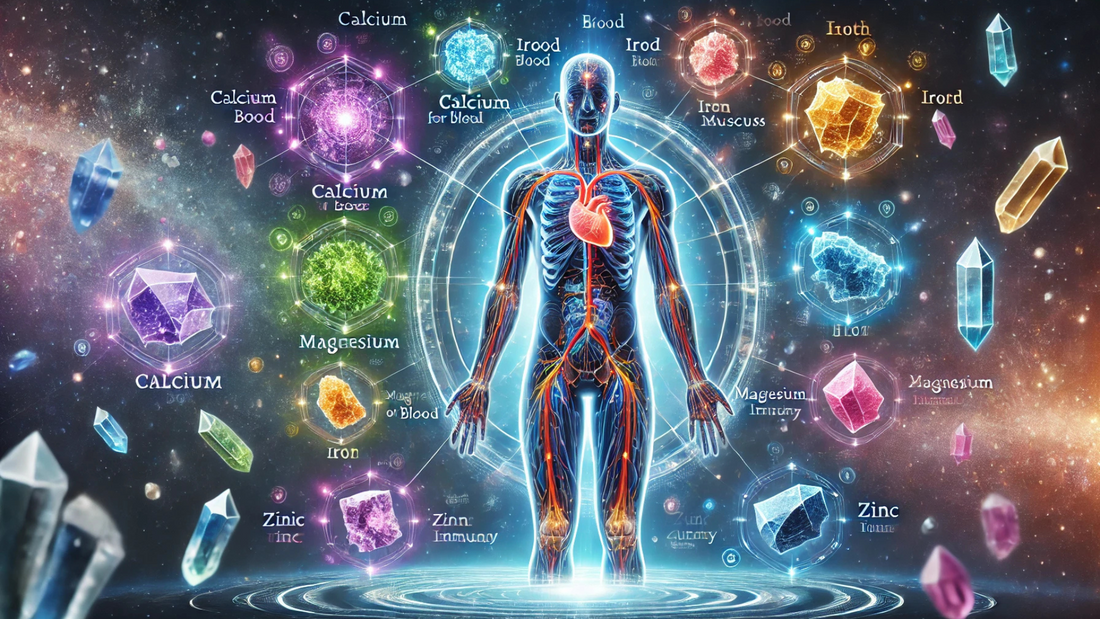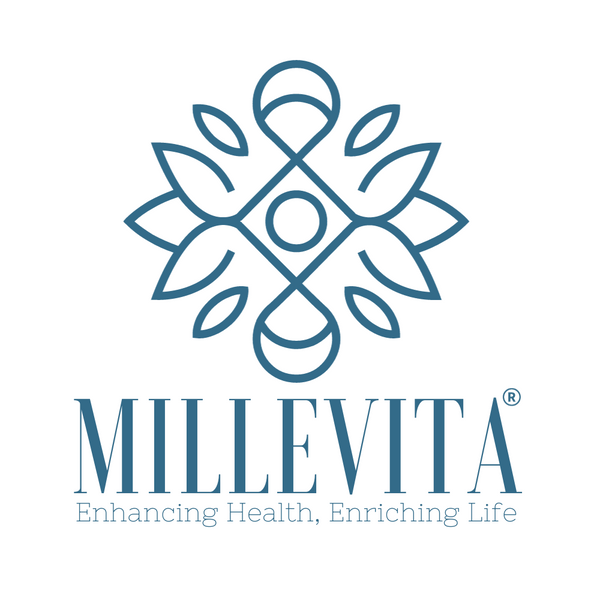
Mineral Marvels: Fueling Your Health, One Element at a Time
Share
Guide Overview
Introduction
At Millevita, we believe minerals are the unsung heroes of health – powering everything from bone strength and muscle function to mood and energy. Miss out on these little wonders, and you might just feel like you’re running on empty. Let’s dive into the essentials!
Key Macrominerals
Macrominerals are needed in larger amounts—usually over 100 mg daily. They play big roles in keeping your bones strong, muscles working, and nerves firing on all cylinders.
| Mineral | Approx. Daily Need* | Main Roles | Best Food Sources | When You’re Lacking | Too Much of a Good Thing |
|---|---|---|---|---|---|
| Calcium | ~1,000 mg (adults) (1,200 mg for women 51+) |
Bone & tooth formation, muscle contraction, nerve signals, blood clotting | Dairy, leafy greens, fortified plant milk, almonds | Weak bones, muscle cramps, brittle nails | Kidney stones, hypercalcemia, interference with other minerals |
| Phosphorus | ~700 mg | Works with calcium for strong bones and energy metabolism | Meat, poultry, fish, dairy, nuts | Bone pain, fatigue, loss of appetite | May lower calcium absorption, risk of soft tissue calcification |
| Magnesium | Men: 400–420 mg Women: 310–320 mg |
Supports hundreds of enzyme reactions, muscle relaxation, nerve function | Nuts, seeds, whole grains, dark chocolate, legumes | Cramps, fatigue, sleep issues, mood swings | High doses can cause diarrhea and medication interference |
| Sodium | ~1,500 mg (AI) | Fluid balance, nerve signals, muscle contractions | Table salt, processed foods, soups | Mild nausea, headache, dizziness | High blood pressure, edema, increased heart risk |
| Chloride | ~2,300 mg (AI) | Maintains acid-base balance and aids in digestion | Table salt, seaweed, olives, celery | Weakness and metabolic imbalance | Often tied to excess sodium intake, causing fluid retention |
| Potassium | Women: 2,600 mg Men: 3,400 mg |
Nerve and muscle function, heart health, fluid balance | Bananas, avocados, legumes, potatoes, leafy greens | Muscle weakness, irregular heartbeats, fatigue | Excess may lead to hyperkalemia, especially in kidney issues |
| Sulfur | No specific RDA (usually covered by protein) | Part of amino acids, detoxification, collagen synthesis | Protein-rich foods, garlic, onions, legumes | Rare if protein intake is adequate | Excess might cause digestive discomfort |
Essential Microminerals
Though only needed in trace amounts, microminerals pack a serious punch when it comes to supporting enzymes, immunity, and hormone balance.
| Mineral | Approx. Daily Need* | Main Roles | Top Food Sources | Signs of Deficiency | Overdose Concerns |
|---|---|---|---|---|---|
| Iron | Men: 8 mg Women: 18 mg (premenopausal) |
Oxygen transport, energy metabolism, immune function | Red meat, lentils, spinach, fortified cereals | Anemia, fatigue, dizziness | Risk of iron overload and digestive issues |
| Copper | ~900 µg | Works with iron for red blood cells, supports immunity | Liver, shellfish, nuts, whole grains | Anemia-like symptoms, low white blood cells | Excess may cause gastrointestinal distress |
| Zinc | Men: 11 mg Women: 8 mg |
Immune support, wound healing, DNA/protein synthesis | Oysters, beef, nuts, dairy | Weakened immunity, poor wound healing, hair loss | Can cause copper imbalance and affect cholesterol |
| Selenium | ~55 µg | Antioxidant protection, thyroid hormone metabolism | Brazil nuts, seafood, eggs, chicken | Fatigue, hair loss, lowered immunity | High doses may cause selenosis and neurological issues |
| Iodine | ~150 µg | Critical for thyroid hormone production and metabolism | Iodized salt, seaweed, seafood, dairy | Goiter, hypothyroidism | Excess may disrupt thyroid function |
| Chromium | Women: 25 µg Men: 35 µg |
Improves insulin action and blood sugar regulation | Broccoli, whole grains, meats, nuts | Impaired glucose tolerance | Limited data; high doses may affect insulin sensitivity |
| Manganese | Men: ~2.3 mg Women: ~1.8 mg |
Antioxidant enzyme cofactor, bone health | Whole grains, nuts, leafy greens, tea | Poor bone health, skin issues | Excess can rarely lead to neurological problems |
| Molybdenum | ~45 µg | Detoxification enzyme cofactor | Legumes, grains, nuts, seeds | Extremely rare deficiency | High doses very rarely cause reproductive issues |
*Values are approximations; actual needs may vary by age, gender, and life stage. Always check with a nutrition expert for personalized advice.
Mineral Relationships
Minerals often work together (or sometimes against each other). Here are a few fun facts:
- Calcium & Phosphorus: Excess phosphorus—often lurking in processed foods—can upset your calcium balance.
- Zinc & Copper: Overdoing zinc might deplete copper, which is essential for red blood cell formation and a robust immune system.
- Iron & Vitamin C: A squeeze of citrus or a burst of bell pepper can boost iron absorption like a charm.
- Calcium & Vitamin K2: Vitamin K2 helps steer calcium where it needs to go (like bones) rather than clogging up your arteries.
- Sodium & Potassium: These electrolytes need to be in balance for your body to keep everything running smoothly.
Boosting Absorption
- Phytates & Oxalates: Present in grains and legumes, they can hinder mineral uptake—but simple steps like soaking or fermenting can help.
- Tannins: Found in tea, coffee, and wine, they might block iron absorption if enjoyed too close to your meal.
- Gut Health: A happy gut means better nutrient uptake. Probiotics and fiber-rich foods keep things moving.
- Caffeine & Alcohol: Too much of either can deplete key minerals. Moderation is key!
- Vitamin Boosts: Vitamin D ramps up calcium uptake, while vitamin C supercharges iron absorption.
Practical Tips for Mineral Balance
- Diverse Diet: Eat a rainbow of fruits, veggies, whole grains, legumes, nuts, and lean proteins to cover your bases.
- Smart Supplementation: Choose supplements that are easy on your body and skip the mega-doses—more isn’t always merrier!
- Mind the Pairings: Enjoy iron-rich meals with vitamin C, balance salty foods with potassium-packed options, and steer clear of too many processed snacks.
Spotting Imbalances
If you’re feeling fatigued, experiencing muscle cramps, or noticing changes in your hair or nails, you might be missing out on key minerals. While these issues are rare from food alone, improper supplementation can sometimes backfire.
Tailored Needs for Different Life Stages
Your mineral needs can change with life’s twists and turns:
- Pregnancy & Nursing: Extra iron, calcium, and iodine may be needed—professional advice is golden here.
- Kids & Teens: Essential for growth, especially calcium, iron, and zinc.
- Seniors: As digestion and metabolism change, calcium and vitamin D become even more important.
Monitoring Your Levels
Regular check-ups and tests (like blood work or hair mineral analysis) can reveal if your mineral balance is off. Don’t hesitate to get professional guidance if something feels off!
Dietary Approaches to Mineral Health
- Vegetarian/Vegan: Plan carefully to get enough iron, zinc, and calcium.
- Low-Carb/Ketogenic: Keep an eye on your electrolytes since reducing carbs can upset the balance.
- High-Fiber: Fiber is fabulous—just be mindful it doesn’t block mineral absorption.
Meal and Snack Ideas
Here are some delicious suggestions to load up on minerals:
- Morning Boost: A hearty bowl of oatmeal topped with chia seeds, berries, and a splash of fortified almond milk.
- Lunch: A vibrant salad featuring spinach, citrus segments, chickpeas, and crunchy pumpkin seeds.
- Afternoon Snack: A small handful of Brazil nuts or almonds paired with a fresh banana and a dollop of nut butter.
- Dinner: Enjoy grilled salmon or marinated tofu (hint: a dash of seaweed adds flavor), alongside roasted sweet potatoes and steamed broccoli.
Lifestyle Impact on Mineral Status
- Stress: Chronic stress can mess with hormone levels and even sap your magnesium and zinc.
- Exercise: Active lifestyles may boost your need for sodium, potassium, and magnesium.
- Medications: Some drugs can deplete minerals—always be in the know with your healthcare provider.
Hot Topics and Ongoing Research
- Calcium & Heart Health: There’s chatter about high calcium supplements and artery calcification—food sources are usually best.
- Iron Overload: Conditions like hemochromatosis remind us that more isn’t always better.
- Selenium’s Role: Ongoing studies explore selenium’s part in thyroid health and autoimmune conditions.
Wrapping Up
Minerals might not always get the spotlight like vitamins do, but they are essential for a vibrant, energetic life. Embrace a balanced and varied diet, pay attention to your body’s cues, and seek expert advice when needed.
Remember: your health is a masterpiece, and every mineral is a vital brushstroke.
In a Nutshell
- Diversity Wins: A whole-foods approach naturally supplies a spectrum of minerals.
- Balance is Key: Minerals interact in complex ways—pair wisely!
- Your Needs Are Unique: Life stages and conditions shift your requirements.
- Stay Informed: Regular testing and professional guidance keep you on track.
Disclaimer: This article is intended for informational purposes only and is not a substitute for professional medical or nutritional advice. Always consult a qualified healthcare provider or registered dietitian for personalized guidance.
References
- National Institutes of Health (NIH), Office of Dietary Supplements – ods.od.nih.gov
- World Health Organization (WHO) – WHO Publications
- U.S. Department of Agriculture (USDA) FoodData Central – fdc.nal.usda.gov
- Academy of Nutrition and Dietetics – eatright.org
- Trumbo, P., et al. (2001). Dietary Reference Intakes – PubMed
- Calcium Fact Sheet – NIH Calcium Fact Sheet



